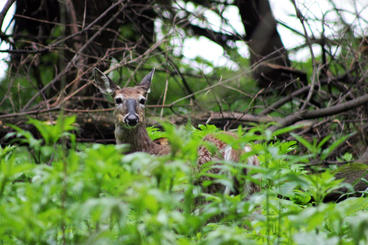
The following are strategies related to fish and wildlife that are included in the Midwest Climate Adaptation Science Center's 2023-2026 Science Agenda.
- 2.1. Assess the population-level effects of warming winters on cool and cold-water fish in streams and lakes.
- 2.2. Assess the vulnerability and adaptive capacity of boreal wildlife.
- 2.3. Assess the effects of decreased snow cover, rain-on-snow conditions, and ice storms on terrestrial wildlife and ecosystems.
- 2.5. Determine the indicators and effects of phenological mismatch and false springs on at-risk terrestrial species.
- 3.7. Assess and predict changes in future abundance and distribution of high-value fish species and at-risk aquatic organisms.
- 3.9. Assess the effects of climate change on recreational angling and subsistence fisheries.
- 4.4. Advance climate knowledge for under-studied terrestrial species.
- 4.5. Assess climate-driven changes in the abundance and distribution of priority wildlife species.
- 4.7. Assess the potential for range shifts to or from Tribal lands, or local extirpation of focal species from Tribal lands.
- 4.10. Determine climate vulnerability in the non-breeding season for priority wildlife (e.g., migratory species).
Read the full Science Agenda.
